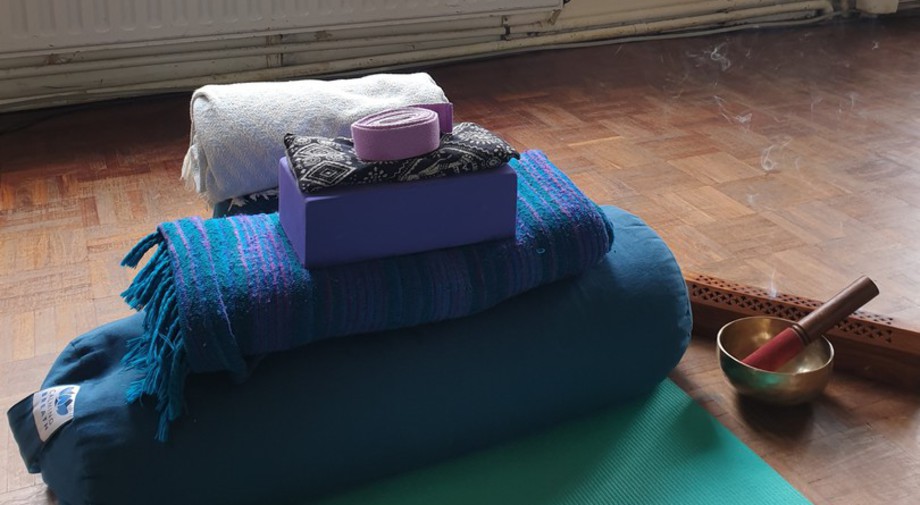
What is Restorative Yoga?
Restorative Yoga, the Parasympathetic Nervous System and You
What is Restorative Yoga, and why do I need it?
Restorative Yoga originated with BKS Iyengar in Pune, India. He invented the practice in order that sick or injured people could still do yoga, without any stress or strain on their physical bodies. It is a super slow, supine (lying down) practice, where each asana is held for 10 minutes or more. You will be supported by various props and snuggled up in blankets. It is often confused with Yin yoga, perhaps because both practices are slower and involve props, but in fact the two styles are very different. In Yin yoga the practitioner is holding asana with a moderate amount stress on the connective tissues and joints, whereas in Restorative the aim is to be utterly relaxed. Today, Restorative yoga is thought of less in terms of rehabilitation for the sick, but as a remedy for something nearly every person I have ever met is suffering from in one form or another: stress, burn out, anxiety or mental exhaustion.
Stress and the body
In a study in 2018 in the UK, the Mental Health Foundation discovered that “74% of people have felt so stressed they have been overwhelmed or unable to cope”*. The sad truth is that feeling this way appears to be the new normal, and not only are people stressed to the point of breaking, but they do not know how to relieve the stress. Stress has physiological effects on the body. You may have a crucial deadline at work, be running late for an appointment, or have a big bill to pay, but your body reacts the same way as if you were being chased by a hoard of flash-eating zombies! You produce excessive amounts of the stress hormones cortisol, adrenaline and norepinephrine, sending the body into fight or flight mode. After the deadline has passed or the bill paid, you may find yourself shaky, jittery or agitated. It is very common to feel exhausted, yet unable to sleep. You may experience digestive disorders, find yourself becoming ill more often, or notice your body aching mysteriously as your immune system is suppressed and inflammation is rife. The simple fact is that chronic stress is bad for your health. You gotta find a way to manage it!
How Restorative Yoga can help
While the recent boom in “self-care” is wonderful, it can sometimes be a buzz word that gets thrown about without much understanding. If you’re suffering from long term stress and associated adrenal fatigue, painting your nails or having some cake isn’t going to cut it! This is where Restorative Yoga comes in. In a Restorative class you will be slowly guided into several poses that gently stretch and ease the body into relaxation, while being talked through some simple guided meditations. The room will be warm and cosy, dimly lit and with some quiet meditation music in the background. Your teacher will make sure that in every pose you are fully supported with props such as bolsters, blocks, blankets, straps and eye pillows in order that you can completely relax. Sometimes the simple act of committing to a restorative yoga class give you the ‘permission’ you need to truly let go.
The Parasympathetic Nervous System and the Vagus Nerve
As you start to focus on diaphragmatic breathing and encouraging a meditative state, the heart rates slows, and the tension begins to melt away. Just as the body reacts to stress, so does it react to relaxation. As any perceived threats are extinguished, the parasympathetic nervous system is stimulated. This is the state of so called “rest and digest”, as opposed to the “fight or flight” mode we talked about earlier. In this state the Vagus nerve (the longest nerve of the autonomic nervous system, responsible for regulating many critical functions of human physiology, including heart rate, blood pressure, digestion) is stimulated, and indeed regular practise even improves the efficiency and accessibility of this resting, healing state. The more time you spend cultivating this deep relaxation, the easier it will be to attain, thanks to the action of neuroplasticity. The more time you spend in this state, the higher your “vagal tone” will be. High vagal tone enables your body to relax faster after encountering stressful situations, giving the body resilience to the stresses of modern life.
Make time for relaxation
Life moves at a crazy pace, and your time is precious. I know it can be really hard to prioritise your wellbeing over something perhaps more measurable, such burning a specific amount of calories or running a certain number of miles, but you can’t cheat your physiology! If you are always pushing and striving for the next achievement, you may just find yourself in a pickle. If you are unable to find a class near you why not take 15 minutes to try a supported savasana at home? Set a timer for 10 minutes so that you can switch of and not clock-watch (I recommend www.insighttimer.com for a free app that is less aggressive than your normal alarm!). Lay back on your yoga mat, placing a bolster or pillows underneath your knees, cover yourself with a blanket and pop an eye pillow or eye mask over your eyes. Become fascinated with your breath, notice your belly rising toward the ceiling as you inhale, falling and softening as you exhale. Count the breaths up to 10, and then back down again. Allow your exhales to lengthen with each breath. Before you know it your timer will be gently calling you back. Take your time to come back to your regular breathing, wriggle your fingers and toes. Move slowly. Notice how you feel. I feel calm even typing it. I hope you love it as much as I do - let me know in the comments!
Guiding Restorative Yoga classes is one of my favourite things, because there is something very special and transformative about the experience. I am honoured to witness the change in people. You will float out of class in your “bliss bubble”, and remember, the more you practise it, the easier this calm, blissful state is to attain.
You can experience Restorative Yoga every night with me on my retreat with Lucia Yoga this August 7-12th in Granada. Please visit https://www.luciayoga.com/beach-yoga-holidays-granada/ for more information or to book
https://www.mentalhealth.org.uk/statistics/mental-health-statistics-stress

